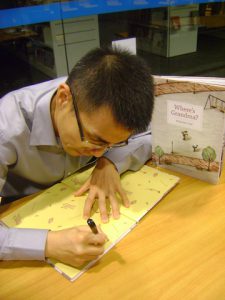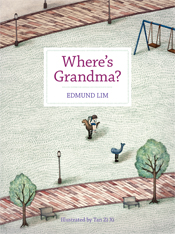Losing Grandma
An author of a children’s book delves into the serious topic of Alzheimer’s disease.
BY: Eleanor Yap
“Where’s Grandma?” is a simple and easy-to-read book that brings to light the relationship of a young boy named Luke and his best friend – his Grandma. They would do everything together including strolling in the park and playing in the playground.
However, after his grandma’s fall, things took a turn for the worse. The author, Edmund Lim, tackles the subject of Alzheimer’s disease, a form of dementia, and shares how Luke copes with losing his Grandma to the disease. It is a poignant story that many can relate and something the young as well as those older should be more aware of. Agelessonline chats with Lim to find out why he wrote the book and why it is importance to continue talking about the condition:
Why did you decide to write the book and when did you write it?
I wrote the book in 2006. Singapore has a greying population and I thought it would be helpful to educate our younger generation of children about dementia and Alzheimer’s disease (AD) in a meaningful and engaging manner. Hence, I wrote the storybook about Luke, his family and grandmother who had AD.
Incidentally your grandmother had Alzheimer’s. Can you tell me more about her and her condition? How young were you and what were your views on her condition?
Like Luke, I was also close to my grandparents including my grandmothers, when they were still around. My maternal grandma was actually diagnosed with AD after I wrote about the book. I was then an adult. Though she was forgetful and her memory was affected, she remained very dear to me. We would do simple things. I would visit her with my children and hold her hands, to be with her and to let her know that she was loved. I was initially sad and worried that she was affected by AD but I realised that what was more important was to respond positively to the situation. One way was to appreciate what “Ah Ma” could still do and spend quality time with her. It can be as simple as sitting next to your loved one and talking to him or her about topics that he or she is interested in.
You said you fear Alzheimer’s. Can you elaborate on what you mean?
In the past, I personally feared getting AD as I did not want to lose my memory and mental faculties. I would not want to forget my loved ones and my life. At the same time, AD can happen to anyone, especially the elderly. Hence, it is important for us to be proactive and to educate the people around us, while taking good care of our health.
Since your book is a children’s book, Alzheimer’s is quite a serious topic. How do you want children to take it? Is it better if parents read the book to them? Have you read your book to your children and how did they react to it?
My book is written in a child-like manner. Yes, the topic is serious. Hence, I tried to make it engaging by relating it to purposeful and memorable episodes in the life of a child. At the same time, this book is meant for adults too. It presents the facts in a realistic and heart-warming way.
It will definitely be helpful if parents can read the book to their children. They can discuss the incidents and chapters in the book with each other. Yes, I have read the book to my two children. They found the story moving and a little sad. They found the ending of the story unconventional too.
Why did you choose to write it from a child’s perspective instead of an adult’s perspective?
I feel by doing it this way, it helps for children to understand the nature of AD and it can benefit the readers to see these matters through the eyes of a child. It can also appeal to the children and the child in us.
Do you feel there is a lack of awareness about Alzheimer’s disease?
There is now more awareness about AD. At the same time, I feel there is still room for improvement. More children and families can be made aware of ways to respond proactively to AD and other forms of dementia.
I understand you wanted the book to be positive and not idealistic. Can you explain?
The challenges of AD are portrayed realistically. The pain and difficulties faced by the family members are depicted in the book. At the same time, the family members in the story sought to respond positively to the illness and challenges.
What was your end goal to writing this book and do you think you have achieved it?
One key goal is to educate and touch lives, as well as to help families affected by members with dementia. This can be done through sharing of available resources and avenues of help such as ADA. The goal is not an end product but an on-going journey, a work in progress.
In what way has the Alzheimer’s Disease Association (ADA) (Singapore) supported you?
ADA kindly helped in the publication of the first edition by getting funding from a charity foundation to publish the first edition. Epigram Books appreciated the quality of the story and proposed to publish a second edition and they generously funded the publication. ADA bought copies of the second edition for a Book Reading Club discussion that happened in September.
I understand you run a school. Can you provide more details and in your school, is the book required reading?
I serve in Huamin Primary School, a pleasant primary school in the Yishun neighbourhood. My school actively promotes reading and we collaborate closely with the National Library Board. We encourage our pupils to love learning and reading. My book is not required reading in my school.
How has the feedback been on your book and how many copies were printed?
The feedback from various readers has been encouraging so far. About 1,000 copies have been printed.
What is your wishlist regarding Alzheimer’s disease in Singapore?
My hope is that more people will be aware of AD and be better prepared in terms of responding positively and successfully to it. I also hope that it can bring families closer together for good as they support each other in the face of this illness. I also hope that there can be a cure for it someday.
Your next book, which is called “How’s Grandpa?”, will be on Parkinson’s disease and will again be from a child’s perspective – a granddaughter this time – and her grandfather. Why this topic and when do you hope to complete it?
Parkinson’s disease affects a number of elderly in Singapore. Similarly, it will be good for more people to be aware of this illness and ways to respond to it. In this upcoming book, which will be written during the December holidays, the voice of Grandpa will be more evident as Grandpa grapples with this disease, with the support of his granddaughter.
What’s next after? A series of other elderly-related conditions?
I also have written a few history-related books. One of my children’s books is on the millionaire-philanthropist Jacob Ballas, who grew up in Singapore. I would like to continue writing history-related books to inform, interest and inspire readers, especially the younger generation. I hope my books including “Where’s Grandma?” will make a positive difference in the lives of my readers.
** The book is sold at Popular bookstores and other established bookstores. The second edition with its hardcover and coloured illustrations costs S$24.50. You can also borrow it from the National Library Board.




0 Comments
Trackbacks/Pingbacks